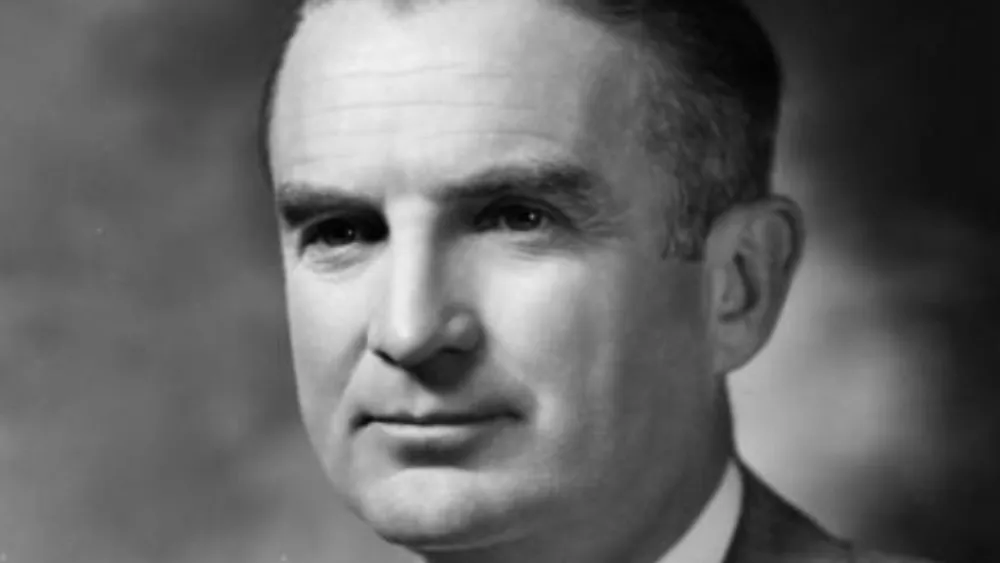Stuart Symington left an impactful effect on the United States through a life defined by visionary leadership, patriotism, and an unwavering dedication to public service. From his early years shaped by a deep sense of duty, through pioneering work in American aviation and defense, to his decades in the Senate, Symington helped chart the nation’s course during some of its most pivotal moments.
His contributions were not confined to one sphere—he bridged the worlds of business, military leadership, and politics, embodying the potential of service-driven leadership to change history.
Born on June 26, 1901, in Amherst, Massachusetts, and passing away on December 14, 1988, in New Canaan, Connecticut, Stuart Symington’s life spanned nearly the entire 20th century. During that remarkable lifetime, he witnessed and influenced the rise of American air power, the evolution of civil rights, and the dawn of the space age.
This article takes a closer look at his journey—one defined by determination, courage, and a belief in the power of American innovation to secure peace and prosperity.
Early Exposure to Duty and Patriotism
Symington’s deep-seated commitment to public service can be traced to his upbringing. He was born into a family whose legacy of patriotism and civic duty stretched back generations. His father, William Stuart Symington, served as Assistant Secretary of War during World War I—a role that brought the weighty responsibility of supporting the nation’s defense during one of the most tumultuous periods in modern history.
In this atmosphere of service and accountability, young Stuart learned early that contributing to the nation’s welfare was not merely an aspiration but an obligation. Dinner table conversations in the Symington household often revolved around military policy and public service, reinforcing in him a sense of purpose.
This environment cultivated Stuart’s curiosity, discipline, and moral clarity—qualities that would guide him throughout his career.
His formative education began at the prestigious Groton School in Massachusetts, where he demonstrated not only academic excellence but a natural aptitude for leadership. Groton was known for shaping generations of influential Americans, instilling in its students the ideals of civic responsibility and rigorous scholarship.
Symington’s years at Groton laid a solid intellectual foundation, and classmates and teachers alike recognized his capacity for strategic thinking and organization.
After Groton, Symington attended Yale University, graduating in 1923. At Yale, he further honed his leadership skills and cultivated relationships that would later become invaluable. The rigorous curriculum and the exposure to diverse viewpoints helped deepen his understanding of complex social and economic issues.
Although he could not have foreseen it at the time, the skills and insights he gained would prove essential as he navigated the intersection of industry, national security, and politics.
A Visionary in Business and Aviation
Armed with his Yale education and driven by an entrepreneurial spirit, Symington embarked on a business career that would eventually propel him to the forefront of America’s aviation and industrial sectors.
He began at Dillon, Read & Co., a prominent investment bank, where he learned the intricacies of finance, investment strategy, and corporate leadership. This experience provided him with a sophisticated understanding of how industrial power underpinned national strength.
Later, Symington joined the Emerson Electric Manufacturing Company, where he served as president. Under his stewardship, Emerson evolved from a small regional enterprise into a major manufacturer of aircraft gun turrets and other vital military equipment.
Symington’s leadership at Emerson during the 1930s and 1940s was transformative—not only for the company but for America’s preparedness as tensions mounted across Europe and Asia. His forward-thinking approach to production and innovation positioned Emerson as a crucial player in the defense industry, illustrating his capacity to anticipate national needs and act decisively.
In 1930, further demonstrating his vision, Symington founded American Export Airlines, which later merged with Pan American World Airways (Pan Am). At the dawn of commercial aviation, he foresaw the sector’s potential to connect continents and expand economic opportunity. His work helped lay the groundwork for the rise of commercial air travel as an essential facet of American life.
These achievements reflected not only business acumen but also a profound belief that technological progress and industrial strength were inseparable from national security.
Service to the Nation in World War II
When the United States entered World War II, Symington did not hesitate to serve. His reputation as a skilled industrial leader and his previous exposure to military affairs made him a natural choice for higher responsibility.
He was appointed Assistant Secretary of War for Air, a post that placed him in charge of overseeing the rapid expansion and coordination of America’s air capabilities. Under his guidance, the United States massively increased aircraft production, modernized equipment, and developed the logistical networks that would help win the war.
Symington’s tenure was marked by a unique blend of urgency and innovation. He understood that air power was essential not only for battlefield success but also for projecting American strength around the globe. His leadership directly contributed to the Allied victory and cemented his reputation as a dedicated public servant who could bridge industry and defense.
By war’s end, he was widely respected as an effective administrator whose efforts had helped transform the U.S. into an unparalleled air power.
Stuart Symington: Architect of a Modern Air Force
In 1947, as the United States established the Air Force as a separate branch of the military to address the strategic demands of the nuclear age and the Cold War, President Truman appointed Stuart Symington as its first Secretary, and he embraced the role with vigor.
As Secretary of the Air Force, Symington championed the modernization and technological advancement of air power. He believed that a strong air force was indispensable to deterring aggression and maintaining America’s global influence.
During his tenure, he prioritized research and development, the expansion of strategic bomber capabilities, and the creation of infrastructure that would support rapid response anywhere in the world. His advocacy for technological superiority helped ensure that the U.S. Air Force would become one of the most advanced and formidable in history.
Budget battles and interservice rivalries constantly challenged Symington’s leadership, but he stayed steadfastly committed to building a world-class air defense.
Transition to the Senate and Broader Public Service
After resigning as Secretary of the Air Force in 1950, Symington did not retreat from public life. Instead, he pivoted to electoral politics, driven by a desire to continue shaping national policy.
Missouri voters elected him as a Democratic senator in 1952, launching his 24-year tenure in the Senate. During this period, Symington became known for his expertise in defense and foreign policy, serving on key committees and influencing legislation that shaped America’s Cold War posture.
He balanced his commitment to a strong national defense with fiscal responsibility throughout his Senate career. Symington was also a champion of civil rights and racial equality, reflecting his broader belief in justice and fairness.
He played a significant role in the establishment of the National Aeronautics and Space Administration (NASA) in 1958, underscoring his conviction that technological innovation would be vital to America’s future. By supporting the space program, he helped usher in an era of exploration that would culminate in the moon landing and beyond.
Symington also sought the presidency, launching a bid for the Democratic nomination in 1960. Though he ultimately lost to John F. Kennedy, his campaign elevated issues of defense preparedness and civil rights to the forefront of national debate.

A Legacy of Leadership and Service
Throughout his remarkable life, Stuart Symington embodied the highest ideals of leadership, integrity, and patriotism. His vision and determination transformed the institutions he led—from private corporations to the newly independent Air Force—and shaped the trajectory of American defense policy.
Symington’s contributions were not only institutional but deeply personal. He inspired generations of public servants to approach their work with the same sense of purpose and commitment to the common good.
Even after his retirement in 1976, he remained an influential voice in American politics and public affairs. Policymakers grappling with complex challenges frequently sought his insights and perspectives.
In 1988, the nation mourned as it lost a statesman who had woven his impact into the very fabric of modern American life. He had seen the country through the Great Depression, global war, the Cold War, and the civil rights era—always guided by a belief in American ingenuity and resilience.
Conclusion: The Enduring Example of Stuart Symington
Stuart Symington’s legacy continues to resonate because it reflects the power of dedicated service and the enduring value of principled leadership. His life stands as a testament to the idea that true progress requires not only innovation but also courage, compassion, and a willingness to act in the nation’s best interest.
From the boardrooms of America’s early aviation pioneers to the halls of Congress, Symington helped chart the course of the 20th century. His story remains an inspiration to all who believe that civic duty and vision can shape a better future.
Aspiring leaders in government, business, or community can look to his example as a timeless reminder that greatness begins with integrity, purpose, and a steadfast commitment to serve.









What was Stuart Symington doing in New Canaan Ct? I’m surprised and curious. Thanks, Jim